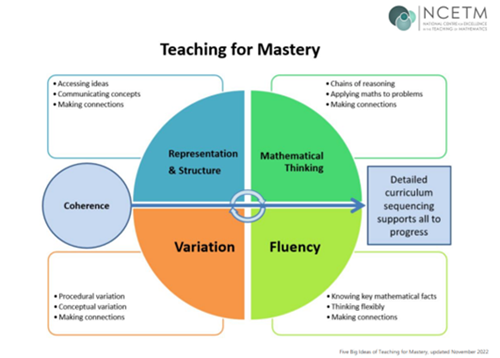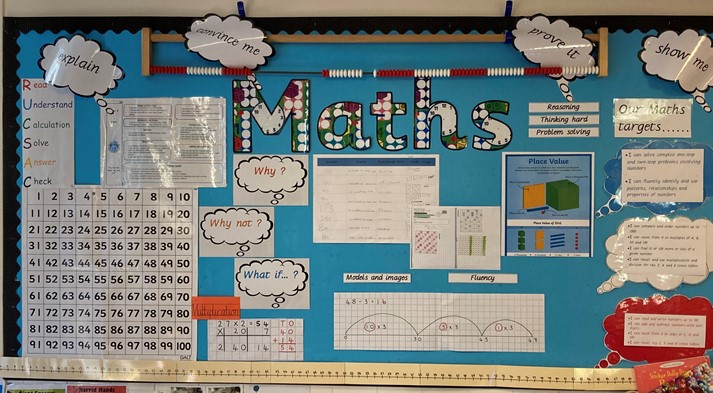Mathematics
At William Reynolds Primary School, we recognise the importance of Mathematics as a tool for everyday life. Our school delivers a broad and balanced progressive curriculum with a range of cross curricular links.
Our three principle aims – following the National Curriculum in England - for Mathematics are:
- For all children to be fluent in the fundamentals of mathematics
- For all children to reason and solve a range of problems
- For all children to make choices about the maths they use and be able to apply with confidence.
We are committed to enabling children to recognise the importance of mathematics in the wider world. Therefore, enabling them to use their mathematical skills and knowledge in future employment confidently.
The core of our mathematics curriculum is the National Curriculum for England, which is supplemented by Power Maths, NCETM Professional Development materials and White Rose. Subject leaders researched a variety of mathematics programmes of work and Power Maths was selected due to being recommended by the DfE. The NCETM outlines the fundamental characteristics that underpin teaching for mastery as being coherence, representation and structure, mathematical thinking, variation, and fluency – commonly referred to as the Five Big Ideas. Power Maths meets the NCETM’s criteria for delivering a mastery approach.

Our coherent curriculum has been specifically sequenced in a logical progression to ensure that new knowledge and skills build on what has been taught before: Early Years to Year 6. This enables our children to know more and remember more. The content of the curriculum is carefully planned - making sure that core mathematical facts, concepts, methods and strategies are systematically acquired. ‘Forward-facing’ knowledge is also prioritised. The teaching of linked facts and methods is sequenced, taking advantage of the way that knowing facts helps children to learn methods and vice versa. End points are clearly identified for each year group; time allocation has been carefully considered to provide children with opportunities to master key concepts. Our curriculum provides access for all children to develop a deep and connected understanding of mathematics that they can apply in a range of contexts.
Efficient, accurate recall of key number facts and procedures is essential for fluency, freeing children’s minds to think deeply about concepts and problems. Our children are provided with regular opportunities to develop their mathematical fluency, enabling them to move flexibly between different contexts and representations of mathematics, recognise relationships and make connections, and to choose appropriate methods and strategies to solve problems.
A high focus on reading fluency throughout school enables our children to read, comprehend and solve mathematical problems with a clear understanding of vocabulary.
At William Reynolds Primary School, we know that the ability to reason mathematically is an important factor in raising academic success - Developing mathematical thinking is a high priority of our mathematics curriculum. Children have various opportunities to explore concepts in depth to ensure they can look for patterns, and relationships, make connections, conjecture, reason and generalise. Within the curriculum, problem solving skills are also developed. Children are taught how to identify different problem types and given the strategies required to solve them. Throughout school, we develop resilience that enables all children to reason and problem solve with increased confidence. All children have access to a high-quality maths curriculum that is both challenging and enjoyable and raises pupil’s aspirations. We widen their horizons through a context rich curriculum, that gives purpose to their learning, through high expectations for every child to succeed.
Representations of mathematics are carefully selected to highlight key mathematical structures. The intention is for these representations to become mental images that children can use to think about mathematics, supporting them to achieve a deep understanding of mathematical structures and connections.
The structure of our mathematics curriculum ensures that teachers provide variation. Variation is essential because it draws closer attention to a key feature of a mathematical concept or structure through varying some elements while keeping others constant. By varying how a concept is represented or the procedures that children can use to proceed through a learning sequence, this enables them to reason logically, make connections and gain comprehensive knowledge.
As a result of the pandemic, our curriculum has not been narrowed however, tutoring has been accessed for pupils who need additional support to close any gaps in their learning.
In order to provide a coherent curriculum, every year group has a yearly Curriculum Map that outlines the key areas of mathematics which will be taught throughout the year. This ensures that adequate amount of time and coverage is allocated to each key area. Detailed Medium Term planning supports teachers to plan a sequence of progressive weekly lessons and over time, giving the children time to master new concepts. Within this document, key objectives, knowledge (including forward facing knowledge) and vocabulary are outlined with fluency, problem solving and reasoning opportunities for each area. Progression documents and the Calculation policy, used to support the Medium-term plan, ensure that staff are delivering a consistent, progressive and challenging curriculum.
Teachers short term planning is developed using the medium-term plan to ensure all areas are taught. Where possible, lessons are contextualised to engage the children further with their learning. This planning includes assessment for learning opportunities, the learning objective for each lesson, linked success criteria and differentiated tasks to meet the objective. With the support of Power Maths, NCETM Professional Development materials & regular CPD, teachers have expert knowledge on how to teach key concepts. Models & images are used effectively to help pupils visualise the mathematics being taught.
Within the lesson, teachers check pupils understanding effectively and address any misconceptions swiftly. The curriculum is designed and delivered in a way that allows pupils to know more and remember more. Children are given opportunities to apply new knowledge and skills fluently before moving onto reasoning mathematically and solving problems. Children who are more likely to struggle or who are at risk of falling behind are given more time to complete tasks so that they can commit core facts and methods to long-term memory. All children are given regular opportunities to develop mathematical thinking.
The EYFS curriculum includes rich opportunities for children to develop a ground understanding in number and their spatial reasoning skills across all areas of mathematics. Throughout the whole of the Foundation Stage, the pupils have opportunities to build and apply their mathematical understanding both inside and outside.
From Year One onwards, basic skills are developed in arithmetic lessons to develop mathematical fluency. Alongside mathematics sessions, an additional 15 minutes a day is spent focusing on securing skills sessions which help build fluency and precision in these areas. Children in Reception and KS1 also participate in the NCETM Mastering Number Programme. This programme aims to secure firm foundations in the development of good number sense and the aim over time is that children will leave KS1 with fluency in calculation and a confidence and flexibility with number.
Times tables are taught daily through mental oral starters, with additional opportunities for children to access Times Tables Rockstars, in school and at home. Times tables are also practised during weekly arithmetic lessons. This enables the children to have rapid and accurate recall enabling them to apply this knowledge to more complex problems.
Investigative tasks are designed to allow pupils to follow lines of enquiry and develop their own ideas, justifying and proving their answers. Children work both collaboratively and independently when solving problems which require them to persevere and develop resilience.
Formative assessment takes place daily, while termly summative assessment takes place in the form of NFER testing which allows analysis of gaps in learning to be quickly addressed. Half-termly ‘Chance to Shine’ assessments take place to identify where pupils have gained understanding.
Those pupils who require additional support are provided with opportunities to catch up through the Numicon interventions and mathematical tutoring.
Our pupils know that maths is a vital life skill that they will rely on in many areas of their daily life. They have a positive view of maths which is evident throughout the high standards of work which pupils clearly take pride with.
The impact of our curriculum is that:
- Our pupils love mathematics and can explain the importance of the subject in their everyday lives. They can also explain how the subject will help them in their future careers.
- Our pupils have a sound understanding of the knowledge and skills they have been taught which prepares them for their next stage of education.
- Our teachers have high expectations for every pupil which is evident throughout the high standards of work which pupils clearly take pride with.
- Our teachers have good subject knowledge and are aware of the resources available to help them plan well-structured lessons.
- Our subject leaders have a clear understanding of the schools’ strengths and areas for improvement. There is a constant drive to ensure that we can be the best we can be.
Progression in Number and Place Value
Progression in addition and subtraction
Progression in multiplication and division
Progression in Fractions, Decimals and Percentages





